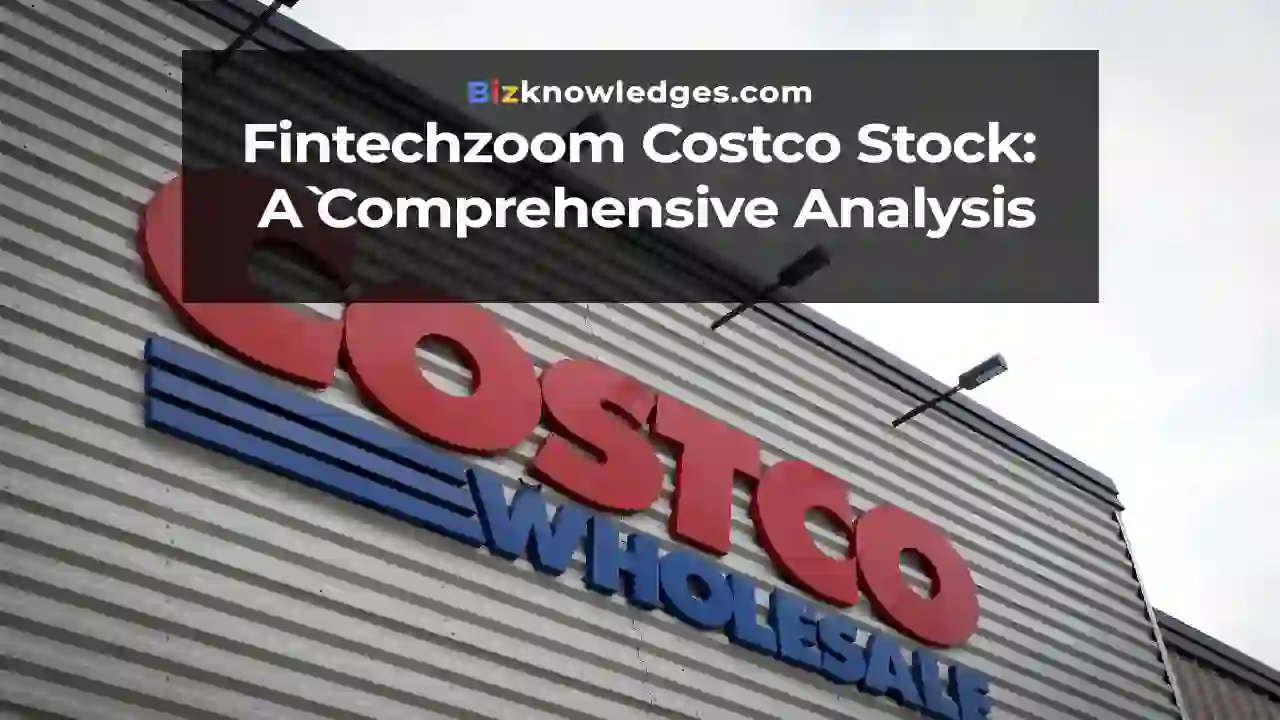Fintechzoom Costco Stock: A Comprehensive Analysis

In the dynamic world of retail investments, Costco Wholesale Corporation stands out as a beacon of stability and growth. Renowned for its bulk goods and membership-only model, Costco has consistently demonstrated robust financial performance, intriguing investors and analysts alike. This comprehensive analysis, brought to you by Fintechzoom, dives deep into the nuances of Costco’s stock (NASDAQ: COST), exploring the factors that have shaped its journey and what future movements might look like.
Why Invest in Fintechzoom Costco Stock?
Investing in Costco stock through Fintechzoom offers a unique blend of stability and potential growth that is hard to find in today’s volatile market landscape. Costco, known for its wholesale business model and loyal customer base, has proven resilient in various economic conditions, making it a compelling choice for investors looking for long-term value.

Firstly, Costco’s business model is a significant draw for investors. The company’s strategy of selling products in bulk at low prices drives high volume sales and consistent foot traffic in stores. This model has not only helped Costco maintain strong sales figures but also ensured a steady cash flow, which is a big plus for stock stability.
Another key reason to consider Costco stock is its adaptability. As a leader in the retail sector, Costco has seamlessly integrated e-commerce and digital strategies into its operations. This forward-thinking approach has allowed the company to stay relevant and competitive, especially as consumer behaviors shift towards online shopping and connecting to wifi for seamless digital experiences.
Moreover, Fintechzoom’s analysis shows that Costco has a robust financial foundation, with impressive revenue growth and a solid track record of shareholder returns. The company’s commitment to paying dividends and buying back stock enhances its attractiveness to investors looking for reliable returns.
In summary, investing in Costco stock through Fintechzoom means betting on a company that not only understands its market but is also prepared to innovate and adapt in ways that preserve and enhance shareholder value. This strategic blend of stability and growth potential makes Costco a standout choice in the retail sector.
Tips for Investing in Costco Stock
Investing in Costco stock can be a wise decision, but like any investment, it requires a thoughtful approach. Here are some essential tips to help you make informed decisions when considering Costco shares:
- Research Extensively: Before investing, read up on Costco’s financial health. Tools and analyses from sites like Fintechzoom provide deep insights into the stock’s performance and market position.
- Consider the Long Term: Costco’s business model is designed for stability and long-term growth. Evaluate how Costco fits into your long-term investment strategy rather than looking for short-term gains.
- Diversify Your Portfolio: While Costco is a strong performer, it’s crucial to diversify your investments to minimize risks. Ensure that your investment in Costco is part of a balanced portfolio.
- Monitor Retail Trends: Being aware of changes in the retail sector, including consumer habits and technological advancements like connecting to wifi, can help you anticipate market shifts that might affect Costco.
- Stay Updated: Keep an eye on the latest news and updates about Costco, especially through insightful analysis of Fintechzoom. Being informed will help you make timely decisions based on the most current data.
Costco’s Business Model

Costco’s business model is a fascinating blend of high-volume sales and membership loyalty, which sets it apart from traditional retail competitors. This model is designed to maximize efficiency and customer satisfaction, leading to a strong financial performance and a robust stock outlook.
Membership-Based Structure
At the heart of Costco’s strategy is its membership-based structure. Customers pay an annual fee to access the vast selection of goods at discounted prices. This fee creates a consistent revenue stream and ensures customer loyalty. Members are incentivized to shop frequently to maximize their membership value, which drives recurring sales for Costco.
High Volume, Low Margin
Costco operates on a high-volume, low-margin approach, which means it sells a large quantity of products with a relatively low markup. This strategy relies on rapid inventory turnover and operational efficiency to maintain profitability. By keeping margins low, Costco attracts price-sensitive consumers and maintains its competitive edge.
Limited Product Selection
Unlike other retailers that offer a vast array of brands and products, Costco limits its stock to a selection of fast-selling items. This limited SKU strategy reduces overhead costs and simplifies logistics, allowing for bulk purchases directly from manufacturers at lower prices.
Focus on Quality and Value
Costco is committed to providing high-quality products at unbeatable prices. This commitment extends from generic brands like Kirkland Signature to premium products in electronics, jewelry, and organic food segments. By offering value and quality, Costco strengthens customer trust and loyalty.
Efficient Operations
Costco’s operational efficiency is unmatched, with a strong focus on reducing waste and enhancing customer experience. From streamlined store layouts to effective supply chain management, every aspect of operations is geared towards keeping costs low and operations smooth.
E-commerce and Digital Expansion
Recognizing the shift towards online shopping, Costco has invested in enhancing its e-commerce platform. This digital expansion allows members to shop online and have items delivered to their home, increasing convenience and expanding Costco’s reach beyond the physical warehouse locations.
Sustainable and Ethical Practices
In addition to its economic objectives, Costco places a high emphasis on sustainability and ethical business practices. From environmentally friendly packaging to fair labor practices, Costco aims to maintain a positive brand image and ensure long-term sustainability.

By sticking to these principles, Costco’s business model not only promotes significant savings for its customers but also creates a robust framework for steady growth. This model is a key driver behind the resilience and attractiveness of Costco stock as analyzed by Fintechzoom, ensuring that investors understand the underlying strengths that make Costco a unique and profitable investment opportunity.
Costco Stock Performance Analysis
Costco Wholesale Corporation (NASDAQ: COST) has been a standout in the stock market, demonstrating impressive resilience and consistent growth. This performance analysis will delve into the factors that have driven Costco’s stock success and what investors might expect moving forward.
Historical Performance
Over the past decade, Costco’s stock has shown a remarkable upward trajectory. From a strong base, the stock has climbed steadily, reflecting the company’s increasing revenue and consistent profitability. For instance, over five years, Costco’s stock has nearly doubled, outpacing many of its retail competitors. This growth is a testament to Costco’s solid business fundamentals and its ability to adapt to changing market conditions.
Recent Trends
In the more recent context, despite global economic uncertainties, Costco has maintained strong stock performance. The company’s latest quarterly reports have beaten earnings expectations, underlined by robust sales growth and increased membership renewals. This performance highlights how Costco’s value proposition remains compelling to consumers, even when discretionary spending tightens.
Comparative Analysis
When compared to other players in the retail sector, Costco stands out for its steady growth and lower volatility. While other retailers experience significant fluctuations due to seasonal trends and economic cycles, Costco’s bulk-selling approach provides more stability. Additionally, its strong membership model creates a predictable revenue stream, setting it apart from the traditional retail sales model.
Financial Health
Financially, Costco is on solid ground, with strong balance sheets and cash flow statements. The company boasts a low debt-to-equity ratio, which is uncommon in the retail sector where companies often leverage heavily. Costco’s ability to generate significant cash flow allows it to invest in growth while also returning value to shareholders through dividends and stock buybacks.
Analysts’ View and Fintechzoom Insights
Analysts, including those from Fintechzoom, generally hold a positive outlook on Costco’s stock. The consensus points towards a strong buy or hold position, citing the company’s consistent performance and potential for growth. Fintechzoom’s analysis suggests that Costco’s focus on expanding its e-commerce capabilities and increasing its global warehouse presence are pivotal strategies that could drive future stock performance.
Forward-Looking Statements
Looking ahead, several factors are poised to influence Costco’s stock:
- Expansion Plans: Costco’s ongoing expansion, both domestically and internationally, is expected to fuel growth. New warehouses and the enhancement of existing ones are part of this strategy.
- E-commerce Growth: As more consumers embrace online shopping, Costco’s continued investment in its digital platform is expected to pay dividends, enhancing its revenue streams beyond the traditional warehouse model.
- Consumer Behavior: In a post-pandemic world, consumer preferences are shifting towards bulk buying and value-based shopping — trends that favor Costco’s business model.
- Global Economic Conditions: Fluctuations in the global economy, including trade policies and currency exchange rates, could impact Costco’s international operations and cost structures.
Investor Advice Based on FintechZoom Analysis
Based on comprehensive analysis from FintechZoom, investors considering Costco stock should focus on several key strategies to maximize their investment potential.
- Long-Term Horizon: Costco’s consistent growth suggests that it is best suited for long-term investors. The company’s strong fundamentals and steady performance make it a less risky choice for those looking to hold onto their investments for several years.
- Dividend Advantage: With a reliable record of paying dividends, Costco represents an attractive option for income-focused investors. The dividends provide an ongoing return on investment, aside from the potential capital gains.
- Watch Retail Trends: Investors should keep an eye on broader retail trends, including shifts in consumer behavior and digital connecting to wifi capabilities. These trends can influence Costco’s operations and, consequently, its stock performance.
- Utilize FintechZoom Insights: Leverage the in-depth reports and forecasts provided by FintechZoom to stay updated on Costco’s financial health and market position. This information can guide timely buy or sell decisions, aligning with market dynamics and individual investment goals.
By following these tips and staying informed through reliable sources like FintechZoom, investors can approach Costco stock with a well-rounded strategy that balances potential risks and rewards.
Factors Influencing Costco’s Stock
Several factors play a critical role in shaping the performance of Costco’s stock. Understanding these can help investors make more informed decisions:
- Economic Conditions: Broad economic trends, such as inflation rates, unemployment figures, and consumer spending habits, directly affect Costco’s bottom line. As a retailer that thrives on discretionary consumer spending, Costco’s performance often mirrors the overall health of the economy.
- Membership Growth: As a membership-based warehouse club, the growth in Costco’s membership numbers is a vital indicator of its financial health. Increases in membership fees or growth in member count can significantly boost revenue.
- Supply Chain Dynamics: Costco’s ability to manage its supply chain efficiently impacts its operational costs and overall profitability. Disruptions in the supply chain, such as those caused by global events or local issues, can lead to stock volatility.
- Competitive Landscape: The actions of competitors, including pricing, product offerings, and service enhancements, can influence Costco’s market share. How well Costco adapits and responds to these challenges is often reflected in its stock price.
- Regulatory Changes: Changes in regulations affecting commerce, trade policies, and labor laws can impact Costco’s operations and, subsequently, its stock performance.
- Technological Advances: The integration of technology in retail, from e-commerce enhancements to logistics optimization, plays a significant role. Costco’s efforts in connecting to wifi technology and online sales platforms are key factors in maintaining its competitive edge.
Future Outlook for Costco Stock
The future outlook for Costco’s stock is promising, driven by several strategic initiatives and market factors that are expected to support its growth and profitability.

Continued Expansion
Costco is consistently expanding its warehouse network, both in the U.S. and internationally. This expansion strategy is not just about adding new stores, but also about optimizing existing ones to better serve members. The opening of new warehouses is expected to drive higher sales volumes and attract new members, contributing to Costco’s robust growth trajectory.
E-commerce and Digital Transformation
Costco’s investment in its e-commerce platform and digital transformation has accelerated, especially in the wake of changing consumer behaviors post-pandemic. The company’s efforts to enhance its online shopping experience and improve its connecting to wifi capabilities are likely to result in increased online sales, which could significantly boost overall revenue.
Focus on Consumer Trends
Costco’s ability to adapt to evolving consumer trends—such as the increased demand for organic products, sustainable goods, and private-label brands—is another critical component of its future success. By aligning its product offerings with consumer preferences, Costco can maintain its competitive edge and ensure customer loyalty.
Financial Health and Return to Shareholders
Costco’s strong financial health, characterized by solid cash flows and a conservative debt profile, positions it well for future growth. Additionally, Costco’s commitment to returning value to shareholders through regular dividends and stock buybacks adds to the attractiveness of its stock.
Global Economic Factors
While the global economic outlook can be uncertain, Costco’s broad geographical presence and diversified product range provide a buffer against localized economic downturns. However, investors should remain mindful of global economic conditions, including trade policies and currency fluctuations, which could impact Costco’s international operations.
Analysts’ Perspectives
Analysts, including those from FintechZoom, generally view Costco’s stock positively. The consensus is that Costco’s consistent performance, strategic growth initiatives, and strong customer base position it well for sustained growth. Analysts’ forecasts and ratings often reflect confidence in Costco’s ability to navigate market challenges and capitalize on opportunities.
In conclusion, the future looks bright for Costco stock, with multiple factors contributing to a positive outlook. Investors considering Costco shares should weigh these dynamics carefully, as they suggest a path of continued strength and resilience for the company.
Conclusion
Costco’s robust business model, strategic growth initiatives, and strong financial performance position its stock as a compelling choice for investors. With a focus on expanding its warehouse network, enhancing e-commerce capabilities, and maintaining high membership renewal rates, Costco is set to continue its trajectory of stable growth. By staying informed through analyses from sources like FintechZoom, investors can navigate the retail landscape with confidence, making informed decisions that leverage Costco’s resilience and potential for long-term success.
